Mises, Ludwig von. Human Action: A Treatise on Economics
Подождите немного. Документ загружается.

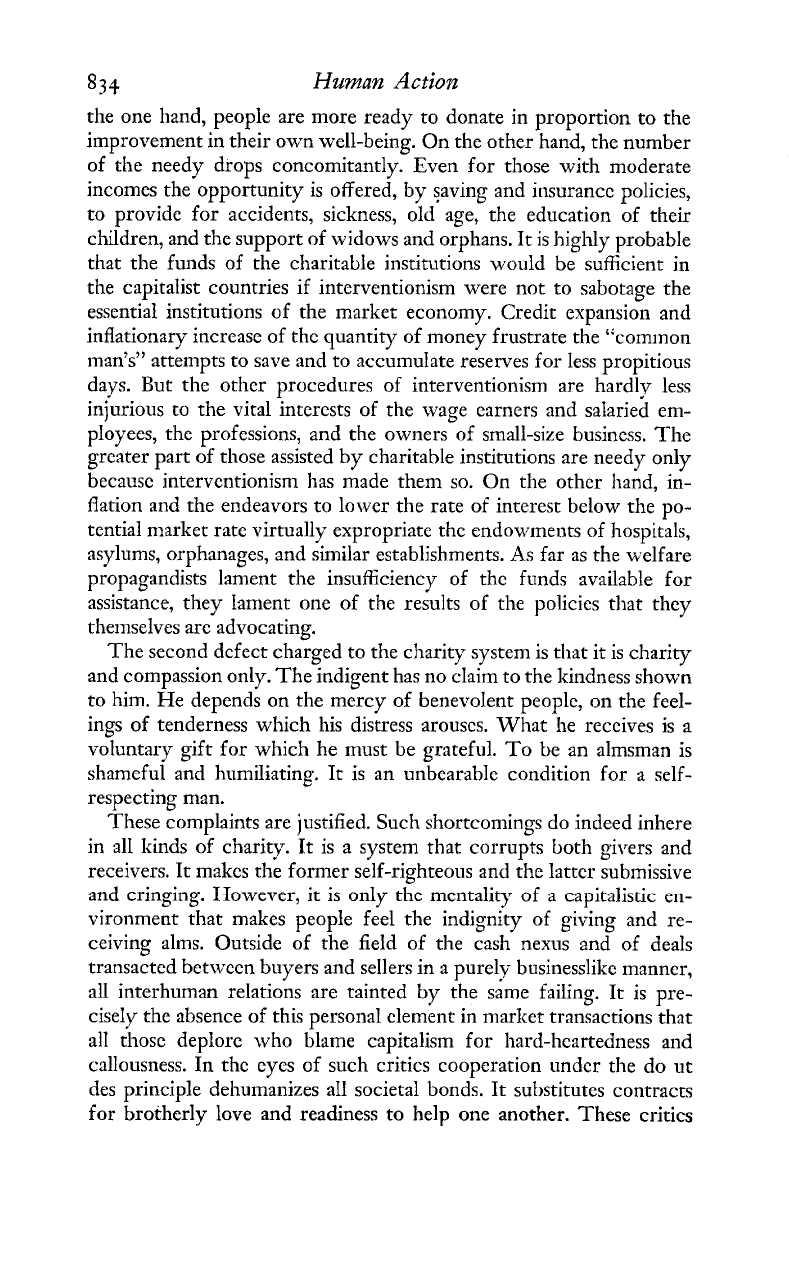
834
Human
Action
the one hand, people are more ready to donate in proportion to the
improvement in their own well-being. On the other hand, the number
of the needy drops concomitantly. Even for those with moderate
incomes the opportunity is offered, by !aving and insurance policies,
to provide for accidents, sickness, old age, the education of their
children, and the support of widows and orphans. It is highly probable
that the funds of the charitable institutions would be sufficient in
the capitalist countries if interventionism were not to sabotage the
essential institutions of the market economy. Credit expansion and
inflationary increase of the quantity of money frustrate the "common
man's" attempts to save and to accumuIate reserves for less propitious
days. But the other procedures of interventionisn~ are hardly less
injurious to the vital interests of the wage earners and salaried em-
ployees, the professions, and the owners of small-size business. The
greater part of those assisted by charitable institutions are needy only
because interventionism has made them so. On the other hand, in-
flation and the endeavors to lower the rate of interest below the po-
tential market rate virtually expropriate the endowments of hospitals,
asylums, orphanages, and similar establishments. As far as the welfare
propagandists lament the insufficiency of the funds available for
assistance, they lament one of the results of the policies that they
theinselves are advocating.
The second defect charged to the charity system is that it is charity
and compassion only. The indigent has no claim to the kindness shown
to him. He depends on the mercy of benevolent people, on the feel-
ings of tenderness which his distress arouses. What he receives is a
voluntary gift for which he must be grateful. To be an almsman is
shameful and humiliating. It is an unbearable condition for a self-
respecting man.
These complaints are justified. Such shortcomings do indeed inhere
in a11 kinds of charity. It is a system that corrupts both givers and
receivers. It makes
thk
former self-righteous and the latter submissive
. .
.
.
c-qiiig.
is
mcnealitj~
of
a
capitalistic
en-
vironment that makes people feel the indignity of giving and re-
ceiving alms. Outside of the field of the cash nexus and of deals
transacted between buyers and sellers in a purely businesslilte manner,
all interhuman relations arc tainted by the same failing. It is pre-
cisely the absence of this personal element in market transactions that
all those deplore who blame capitalism for hard-heartedness and
callousness. In the eyes of such critics cooperation under the do ut
des principle dehumanizes a11 societal bonds. It substitutes contracts
for brotherly love and readiness to help one another. These critics
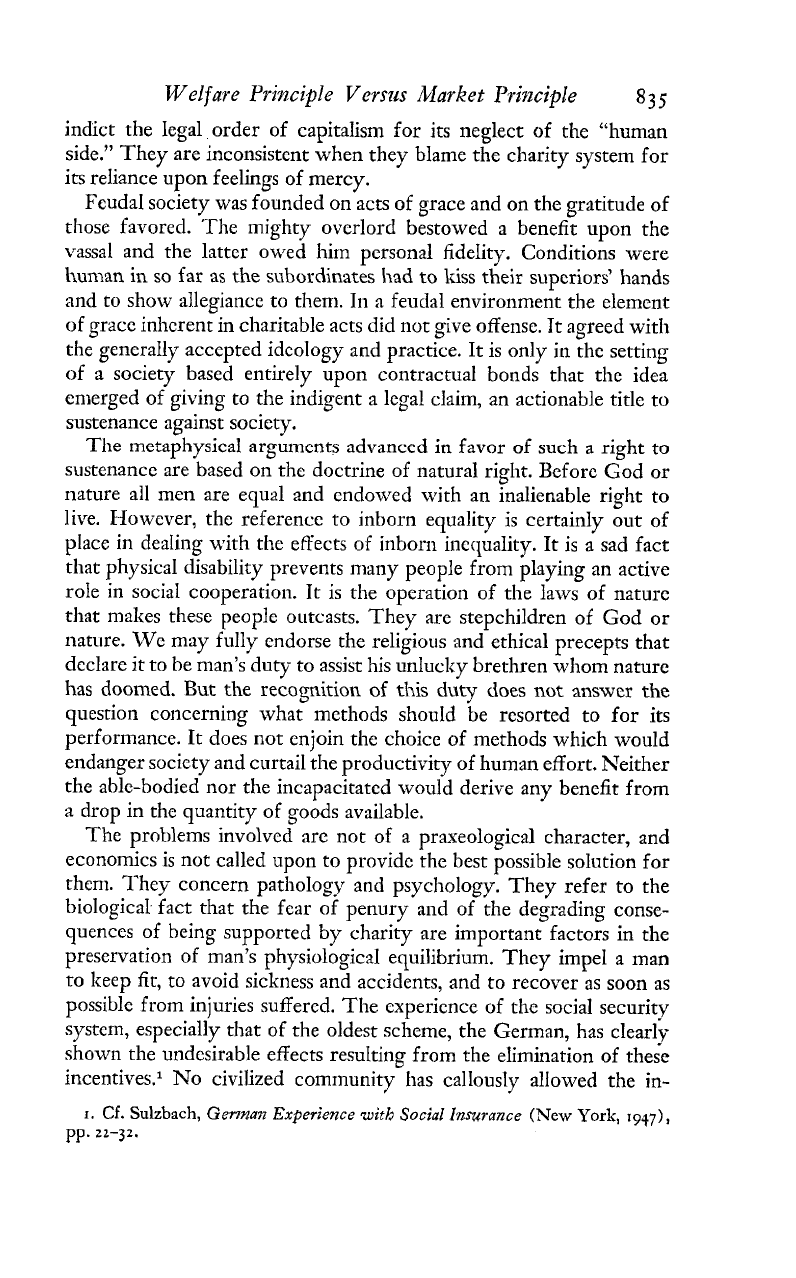
Welfare Principle Versus Market Principle
835
indict the legal order of capitalism for its neglect of the "human
side." They are inconsistcnt when they blame the charity system for
its reliance upon feelings of mercy.
Feudal society was founded on acts of grace and on the gratitude of
those favored. 'The mighty overlord bestowed a benefit upon the
vassal and the latter owed hirn personal fideIity. Conditions were
human
in
so far as the subordinates
had
to kiss their superiors' hands
and to show allegiance to them.
In
a
feudal environment the element
of grace inhcrent in charitable acts did not give offense. It agreed with
the generally accepted idcology and practice. It is only in the setting
of a society based entirely upon contractual bonds that the idea
emerged of giving to the indigent a legal claim, an actionable titlc to
sustenance against society.
The
metaphysical arguments advanced in favor of such
a
right to
sustenance are based on thc doctrine of natural right. Before God or
nature all men are equal and endowed with an inalienable right to
live. Eiowever, the reference to inborn equality is certainly out of
place in dealing with the eRects of inborn inequality. It is a sad fact
that physical disability prevents many people from playing an active
role in social cooperation.
It
is the operation of the laws of nature
that makes these people outcasts. They are stepchildren of God or
nature. We may fully endorse the religious and ethical precepts that
declare it to be man's duty to assist his unlucky brethren whom nature
has doomed. But the recognition of this duty does
not
answer the
question concerning what methods should be resorted to for its
performance. It does not enjoin the choice of methods which would
endanger society and curtail the productivity of human effort. hTeither
the able-bodied nor the incapacitatcd would derive any benefit from
a
drop in thc quantity of goods available.
The problems involvcd arc not of a praxeological character, and
economics is not called upon to providc the best possible solution for
them. They concern pathology and psychology. They refer to the
biological fact that the fear oi penury and of the degrading conse-
quences of being supported by charity are important factors in the
preservation of man's physiolbgica~ equilibrium. Thcy impel a man
to keep
fit,
to avoid sickness and accidents, and to recover as soon as
possible from injuries suffered. The cxpericnce of thc social security
systern, especially that of the oldest scheme, the German, has clearly
shown the undesirable effects resuIting from the elimination of the&
in~entives.~ No civilized community has callously allowed the in-
I.
Cf.
Sulzbach,
Gennan Experience
with
Social
insurance
(New
York,
19471,
pp.
22-32.
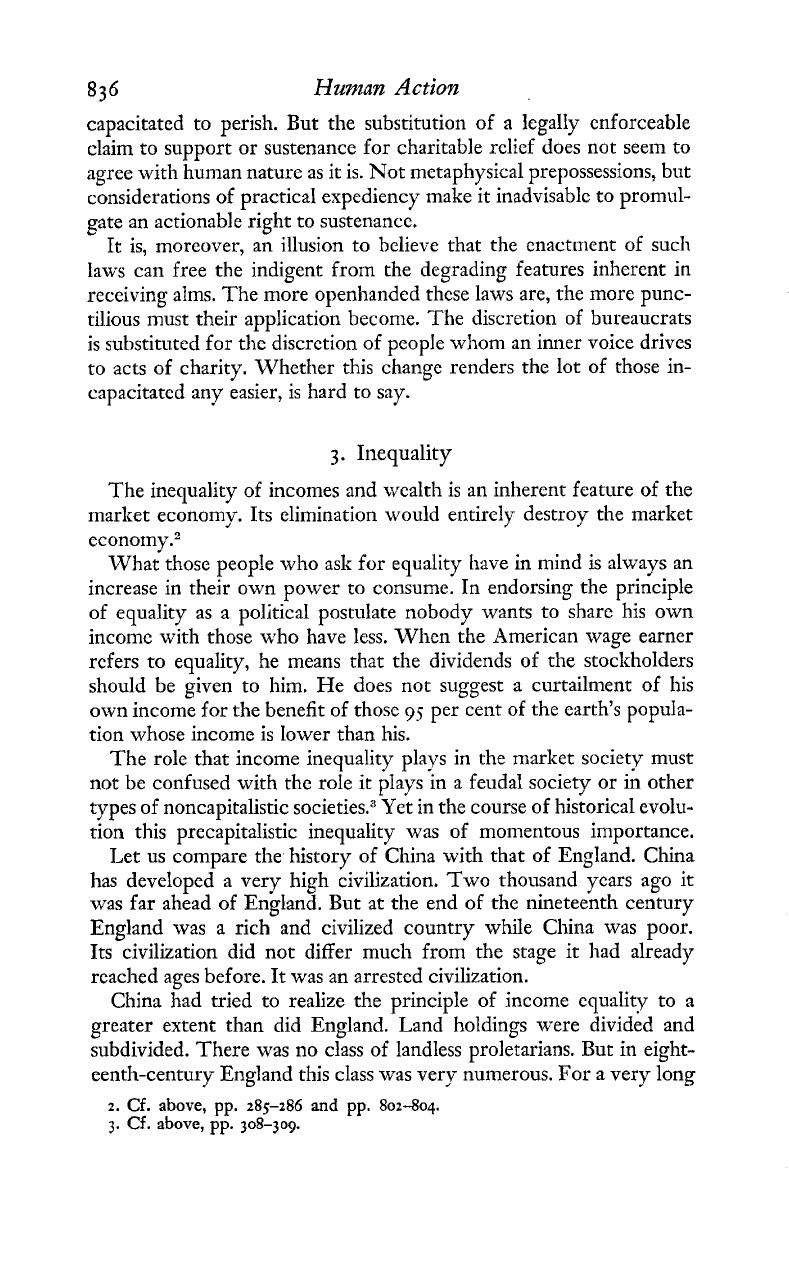
836
Human
Action
capacitated to perish. But the substitution of a legally enforceable
claim to support or sustenance for charitable relief does not seem to
agree with human nature as it is. Not metaphysical prepossessions, but
considerations of practical expediency make it inadvisable to promul-
gate an actionable right to sustenance.
It is, moreover, an illusion to believe that the enactment of such
laws can free the indigent from the degrading features inherent in
receiving alms. The more openhanded these laws are, the more punc-
tilious must their application become. The discretion of bureaucrats
is substituted for the discretion of people whom an inner voice drives
to acts of charity. MJhether this change renders the lot of those in-
capacitated any easier, is hard to say.
3.
Inequality
The inequality of incomes and wealth is an inherent feature of the
market economy. Its elimination would entirely destroy the market
economy."
What thosc people who ask for equality have in mind is always an
increase in their own power to consume. In endorsing the principle
of equality as a political postulate nobody wants to share his own
income with those who have less. When the American wage earner
refers to equality, he means that the dividends of the stockholders
should be given to him. He does not suggest a curtailment of his
own income for the benefit of thosc
95
per cent of the earth's popula-
tion whose income is lower than his.
The role that income inequality plays in the market society must
not be confused with the role it plays in a feudal society or in other
types of noncapitalistic societie~.~ Yet in the course of historical evolu-
tion this precapitalistic inequality was of momentous importance.
Let us compare the history of China with that of England. China
has developed a very high civilization. Two thousand years ago it
was far ahead of England. But at the end of the nineteenth century
England was a rich and civilized country while China was poor.
Its civilization did not differ much from the stage it had already
reached ages before. It was an arrested civilization.
China had tried to realize the principle of income equality to a
greater extent than did England. Land holdings were divided and
subdivided. There was no class of landless proletarians. But in eight-
eenth-century England this class was very numerous. For a very long
2.
Cf.
above,
pp.
285-286
and
pp.
802-804.
3.
Cf.
above,
pp.
308-309.
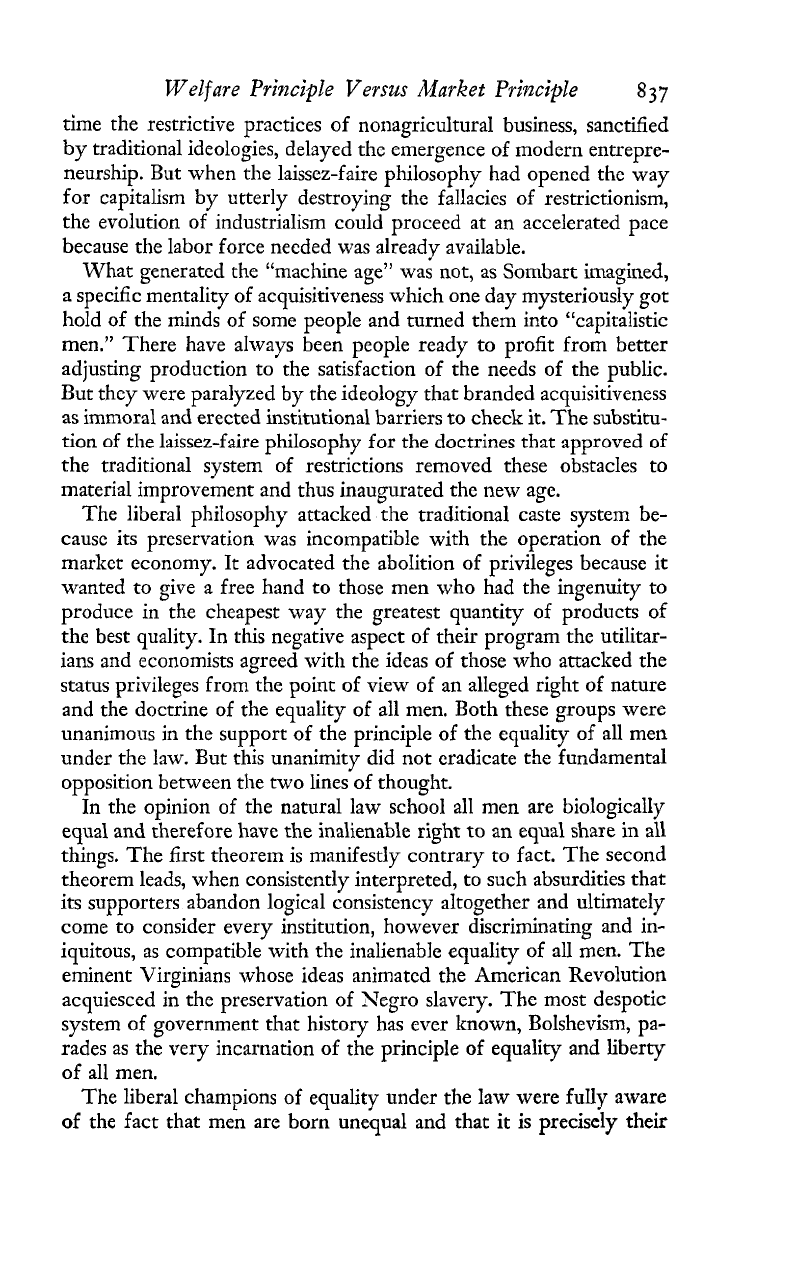
Welfare Principle Versus Market Principle
837
time the restrictive practices of nonagricultural business, sanctified
by traditional ideologies, delayed the emergence of modern entrepre-
neurship. But when the laissez-faire philosophy had opened the way
for capitalism by utterly destroying the fallacies of restrictionism,
the evolution of industrialism could proceed at an accelerated pace
because the labor force needed was already available.
What generated the "machine age" was not, as Sombart imagined,
a specific mentality of acquisitiveness which one day mysteriously got
hold of the minds of some people and turned them into "capitalistic
men." There have always been people ready to profit from better
adjusting production to the satisfaction of the needs of the public.
But they were paralyzed by the ideology that branded acquisitiveness
as immoral and erected institutional barriers to check it. The substitu-
tion of the laissez-faire philosophy for the doctrines that approved of
the traditional system of restrictions removed these obstacles to
material improvement and thus inaugurated the new age.
The
liberal phiIosophy attacked the traditional caste system be-
cause its preservation was incompatible with the operation of the
market economy. It advocated the abolition of privileges because it
wanted to give a free hand to those men who had the ingenuity to
produce in the cheapest way the greatest quantity of products of
the best quality. In this negative aspect of their program the utilitar-
ians and economists agreed with the ideas of those who attacked the
status privileges from the point of view of an alleged right of nature
and the doctrine of the equality of all men. Both these groups were
unanimous in the support of the principle of the equality of all men
under the law. But this unanimity did not eradicate the fundamental
opposition between the two lines of thought.
In the opinion of the natural law school all men are biologically
equal and therefore have the inalienable right
to
an equal share in all
things. The first theorem is manifestly contrary to fact. The second
theorem leads, when consistently interpreted, to such absurdities that
its supporters abandon logical consistency altogether and ultimately
come to consider every institution, however discriminating and in-
iquitous, as compatible with the inalienable equality of all men. The
eminent Virginians whose ideas animated the American Revolution
acquiesced in the preservation of Negro slavery. Thc most despotic
system of government that history has ever known, Bolshevism, pa-
rades as the very incarnation of the principle of equality and liberty
of all men.
The liberal champions of equality under the law were fuIly aware
of the fact that men are born unequal and that it is precisely their
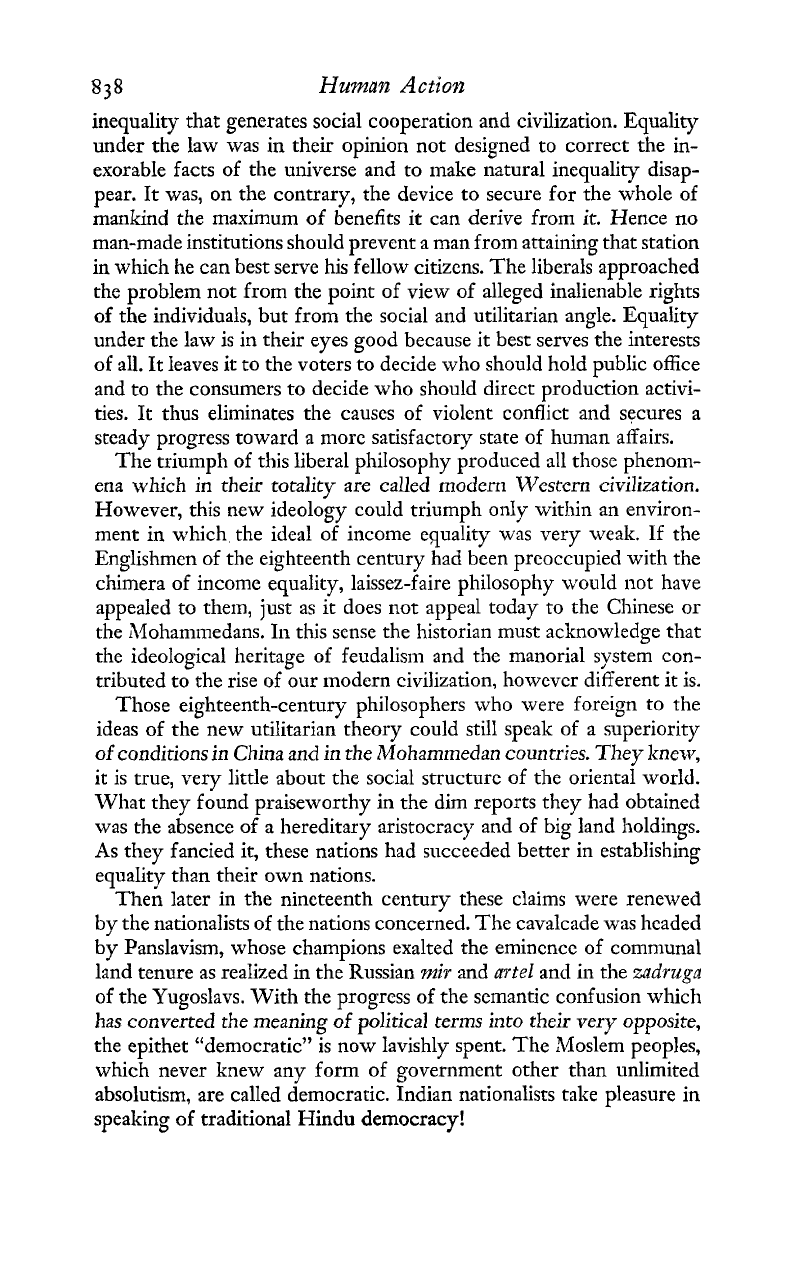
Human
Actioa
inequality that generates social cooperation and civilization. Equality
under the law was in their opinion not designed to correct the in-
exorable facts of the universe and to make natural inequality disap-
pear. It was, on the contrary, the device to secure for the whole of
mankind the maximum of benefits
it
can derive from it. Hence
no
man-made institutions should prevent a man from attaining that station
in which he can best serve his fellow citizens. The liberals approached
the problem not from the point of view of alleged inalienable rights
of the individuals, but from the social and utilitarian angle. Equality
under the law is in their eyes good because it best serves the interests
of all. It leaves it to the voters to decide who should hold public office
and to the consumers to decide who should direct production activi-
ties. It thus eliminates the causes of violcnt conflict and secures a
steady progress toward a more satisfactory state of human affairs.
The triumph of this liberal phiIosophy produced all those phenom-
ena which in their totality are called modern Western civilization.
However, this new ideology could triumph only within an environ-
ment in which the ideal of income equality was very weak. If the
Englishmen of the eighteenth century had been prcoccupied with the
chimera of income equality, laissez-faire philosophy would not have
appealed to them, just as
it
does not appeal today to the Chinese or
the Mohammedans. In this scnse the historian must acknowledge that
the ideological heritage of feudalism and the manorial system con-
tributed to the rise of our modern civilization, howcvcr different it is.
Those eighteenth-century philosophers who were foreign to the
ideas of the new utilitarian theory could still speak of a superiority
of conditions in China and in the Mohammedan countries. They knew,
it is true, very little about the social structure of the oriental world.
What they found praiseworthy in the dim reports they had obtained
was the absence of a hereditary aristocracy and of big land holdings.
As they fancied it, these nations had succeeded better in establishing
equality than their own nations.
Then later in the nineteenth century these claims were renewed
by the nationalists of the nations concerned. The cavalcade was headed
by Panslavism, whose champions exalted the eminence of communal
land tenure as realized in the Russian
rnir
and
artel
and in the
zadruga
of the Yugoslavs. With the progress of the semantic confusion which
has converted the meaning of political terms into their very opposite,
the epithet "democratic" is now lavishly spent. The Moslem peoples,
which never knew any form of governmcnt other than unlimited
absolutism, are called democratic. Indian nationalists take pleasure in
speaking of traditional Hindu democracy!
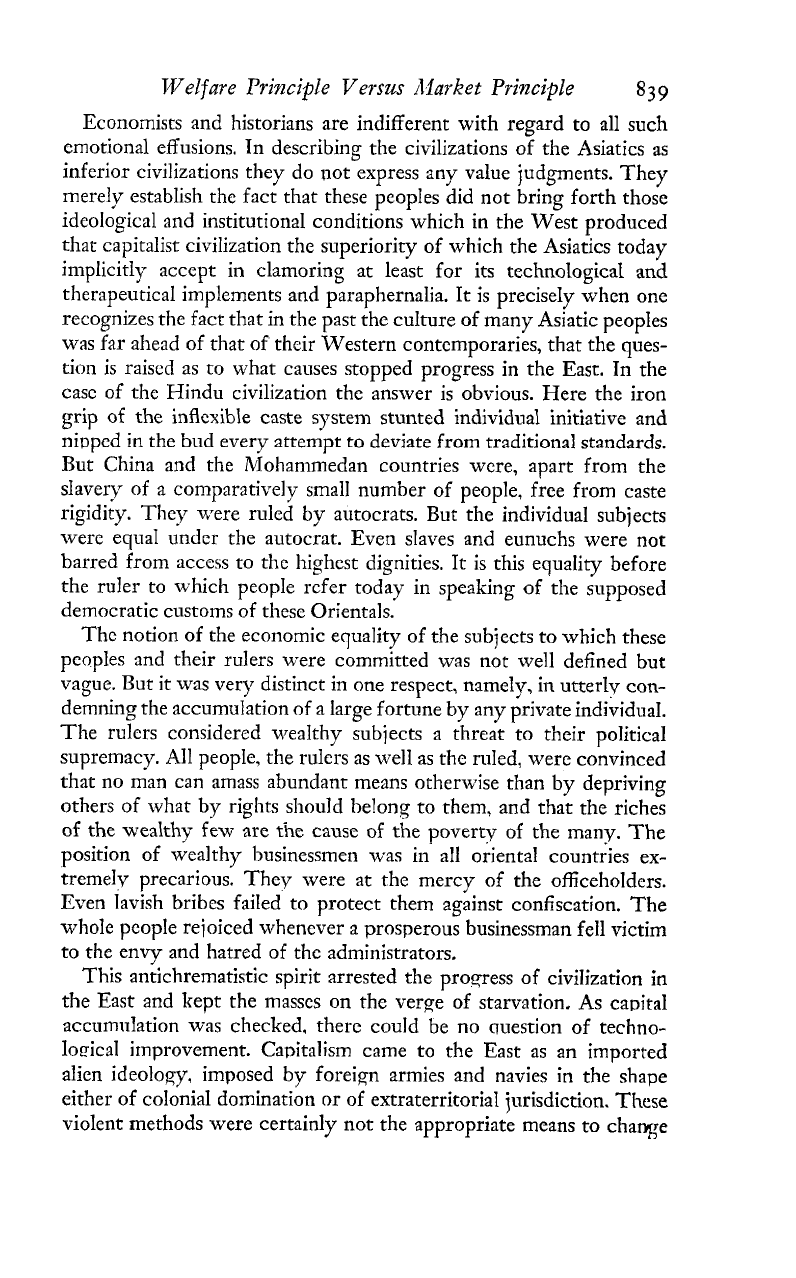
Welfare Prirzciple Versus Market Principle
Economists and historians are indifferent with regard to all such
emotional effusions. In describing the civilizations of the Asiatics as
inferior civilizations they do not express any value jud,ments. They
merely establish the fact that these peoples did not bring forth those
ideological and institutional conditions which
in
the West produced
that capitalist civilization the superiority of which the Asiatics today
in~plicitly accept in clamoring at least for its technological and
therapeutical implements and paraphernalia. It is precisely when one
recognizes the fact that in the past the culture of many Asiatic peoples
was far ahead of that of thcir Western contemporaries, that the ques-
tion is raised as to what causes stopped progress in the East. In the
case of the Hindu civilization the answer is obvious. Here the iron
grip
of
the inflexible caste system stunted individual initiative and
nipped
in
the bud every attempt to deviate from traditional standards.
Rut China and the Mohammedan countries were, apart from the
slavery of a comparatively small number of people, free from caste
rigidiiy. They were ruled by autocrats. But the individual subjects
were equal ukder the autocrat. Even slaves and eunuchs were not
barred from acccss to the highest dignities. It is this equality before
the ruler to which people refer today in speaking of the supposed
democratic customs of these Orientals.
The notion of the economic equality of the subjects to which these
peoples and their rulers were committed was not well defined but
vague. But it was very distinct in one respect, namely,
in
utterly con-
demning the accumuIation of a large fortune by any private individual.
The rulers comidered wealthy subjects a threat to their political
supremacy. All people, the rulers as well as the ruled, were convinced
that no man can amass abundant means otherwise than by depriving
others of what by rights should be!ong to them, and that the riches
of
the wealthy
few
are
the cause
of
the poverty of the many. The
position of wealthy husinessrnen was in all oriental countries ex-
tremely precarious. They were at the mercy of the oficeholders.
Even lavish bribes failed to protect them against confiscation. The
whole people rejoiced whenever a prosperous businessman fell victim
to the envy and hatred of the administrators.
This antichrematistic spirit arrested the proqress
of
civilization in
the East and kept the masses on the verge of starvation.
As
capital
accumnlation was checked, there could be no auestion of techno-
lopica1 improvement. Capitalism came to the East as an imported
alien ideology, imposed
by
foreign armies and navies in the shape
either of colonial domination or of extraterritorial jurisdiction.
These
violent methods were certainly not the appropriate means to change
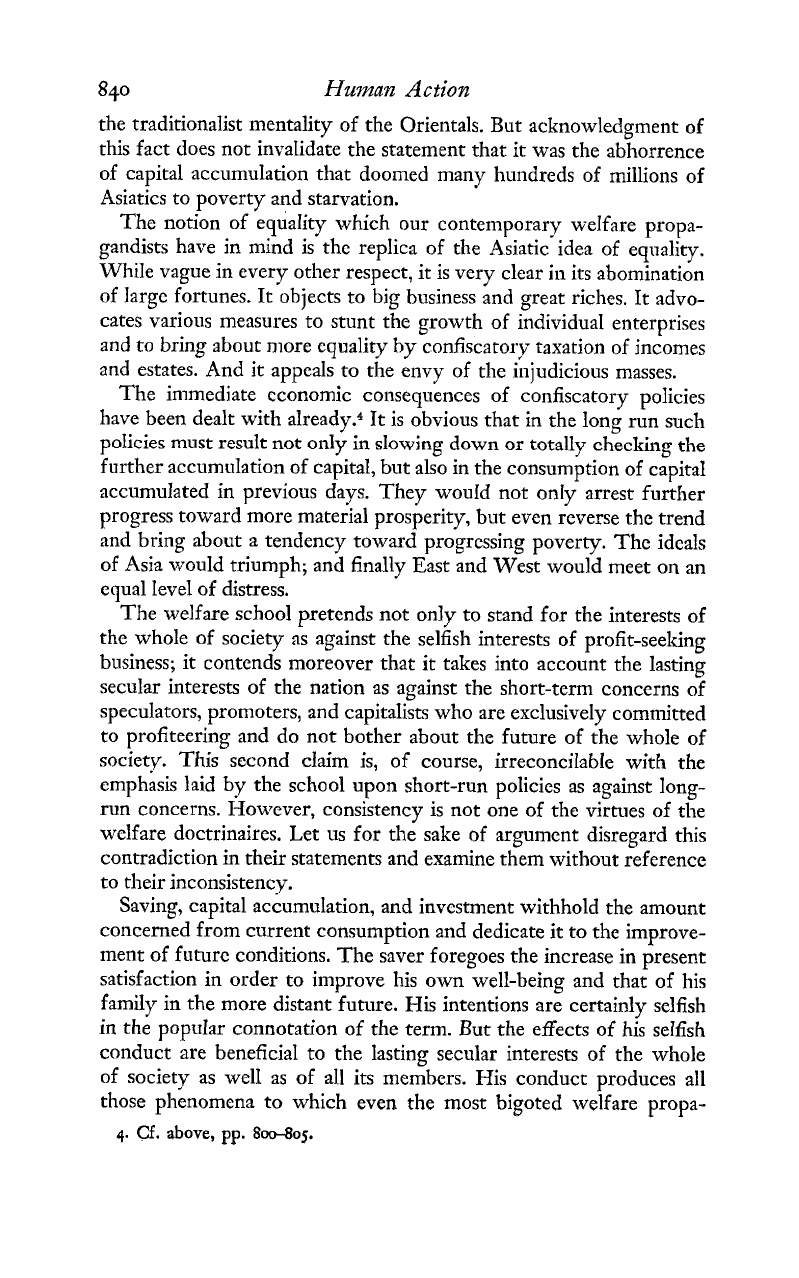
840
Human
Action
the traditionalist mentality of the Orientals. But acknowledgment of
this fact does not invalidate the statement. that it was the abhorrence
of capital accumulation that doomed many hundreds of millions of
Asiatics to poverty and starvation.
The notion of equality which our contemporary welfare propa-
gandists have in mind is the replica of the ~siatic-idea of equality.
While vague in every other respect, it is very clear in its abomination
of large fortunes. It objects to big business and great riches. It advo-
cates various measures to stunt the growth of individual enterprises
and to bring about more equality
by
confiscatory taxation of incomes
and estates. And it appeals to the envy of the injudicious masses.
The immediate cconomic consequences of confiscatory policies
have been dealt with alread~.~ It is obvious that in the long run such
poIicies must result not only in slowjng down or totally checking the
further accumulation of capital, but also in the consumption of capita1
accumulated in previous days. They would not only arrest further
progress toward more rnateiial prosperity, but even reverse the trend
and bring about
a
tendency toward progressing poverty. The ideals
of Asia would triumph; and finally East and West would meet on an
equal IeveI of distress.
The welfare school pretcnds not only to stand for the interests of
the whole of society as against the selfish interests of profit-seeking
business; it contends moreover that it takes into account the lasting
secular interests of the nation as against the short-term concerns of
speculators, promoters, and capitalists who are exclusively committed
to profiteering and do not bother about the future of the whole of
society. This second claim is, of course, irreconcilable with the
emphasis laid
by
the school upon short-run policies as against long-
run concerns. fiowever, consistency is not one of the virtues of the
welfare doctrinaires. Let us for the sake of argument disregard this
contradiction in their statements and examine them without reference
to their inconsistency.
Saving, capital accumulation, and investment withhold the amount
concerned from current consumption and dedicate it to the improve-
ment of future conditions. The saver foregoes the increase
in
present
satisfaction
in
order to improve his own well-being and that of his
family in the more distant future. His intentions are certainly selfish
in the popuIar connotation of the term.
But
the effects of his selfish
conduct are beneficial to the lasting secular interests of the whole
of society as we11 as of all its members. His conduct produces all
those phenomena to which even the most bigoted welfare propa-
4.
Cf.
above,
pp.
800-805.
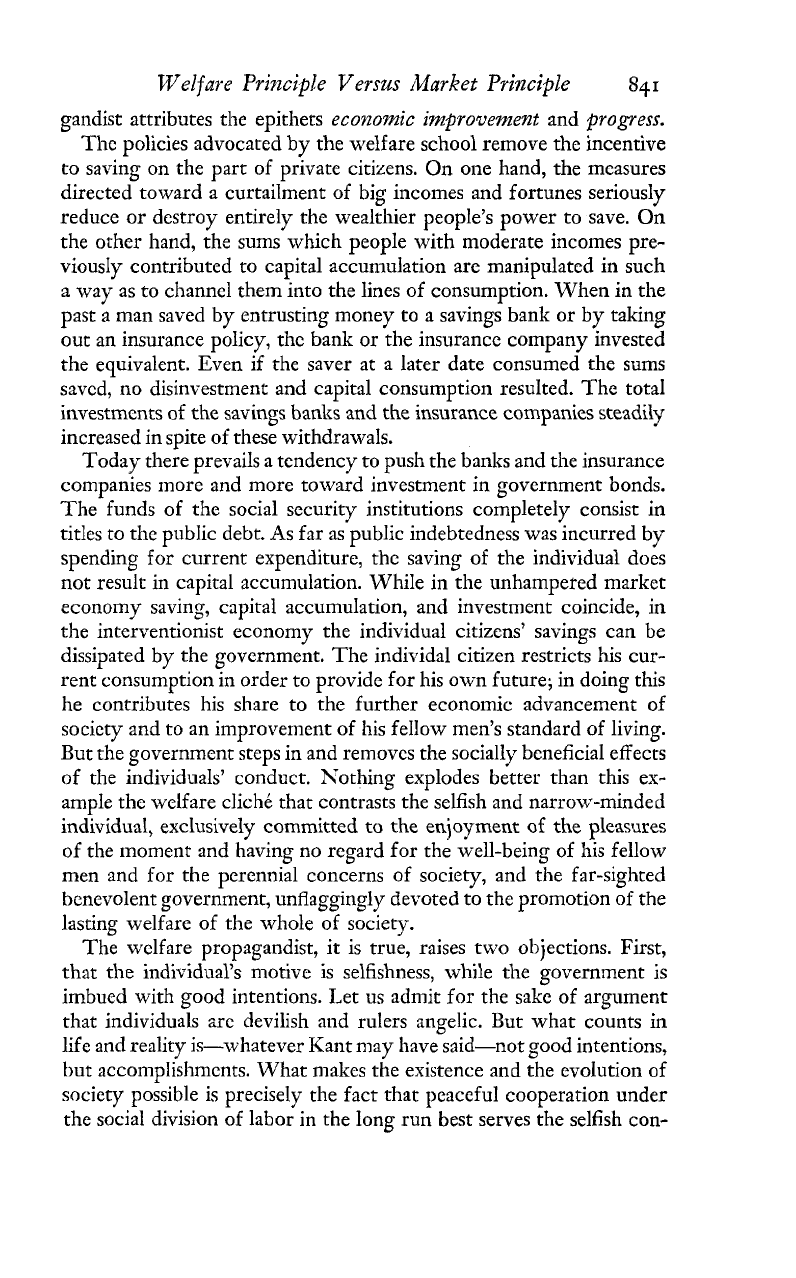
Welfare Principle Versus Market Principle
841
gandist attributes the epithets
economic improvement
and
progress.
The policies advocated
by
the welfare school remove the incentive
to saving on the part of private citizens. On one hand, the measures
directed toward a curtailment of big incomes and fortunes seriously
reduce or destroy entirely the wealthier people's power to save.
On
the other hand, the sums which people with moderate incomes pre-
viously contributed to capital
accumulation
are manipulated in such
a
way as to channel them into the lines of consumption. When in the
past a man saved by entrusting money to a savings bank or by taking
out an insurance policy, the bank or the insurance company invested
the equivalent. Even if the saver at a later date consumed the sums
savcd, no disinvestment and capital consumption resulted. The total
investments of the savings banks and the insurance companies steadily
increased in spite of these withdrawals.
Today there prevails a tendency to push the banks and the insurance
companies more and more toward investment in government bonds.
The funds of the social security institutions completely consist in
titles to the public debt. As far as public indebtedness was incurred by
spending for current expenditure, the saving of the individual does
not result in capital accumulation. While in the unhampered market
economy saving, capital accumulation, and investment coincide, in
the interventionist economy the individual citizens7 savings can be
dissipated by the government. The individal citizen restricts his cur-
rent consumption in order to provide for his own future; in doing this
he contributes his share to the further economic advancement of
society and to an improvement of his fellow men's standard of living.
But the government steps in and removes the socially beneficial effects
of the individuals7 conduct. Kothing explodes better than this ex-
ample thc welfare clichC that contrasts the selfish and narrow-minded
individual, exclusively committed to the enjoyment
of
the pleasures
of the moment and having no regard for the well-being of his fellow
men and for the perennial concerns of society, and the far-sighted
benevolent government, unflaggingly devoted to the promotion of the
lasting welfare of the whole of society.
The welfare propagandist, it is true, raises two objections. First,
that the individual's motive is selfishness, while the government is
imbued with good intentions. Let us admit for the sake of argument
that individuals are devilish and rulers angelic. But what counts in
life and reality is-whatever Kant may have said-not good intentions,
but accomplishments. n7hat makes the existence and the evolution of
society possible is precisely the fact that peaceful cooperation under
the social division of labor in the long run best serves the selfish con-
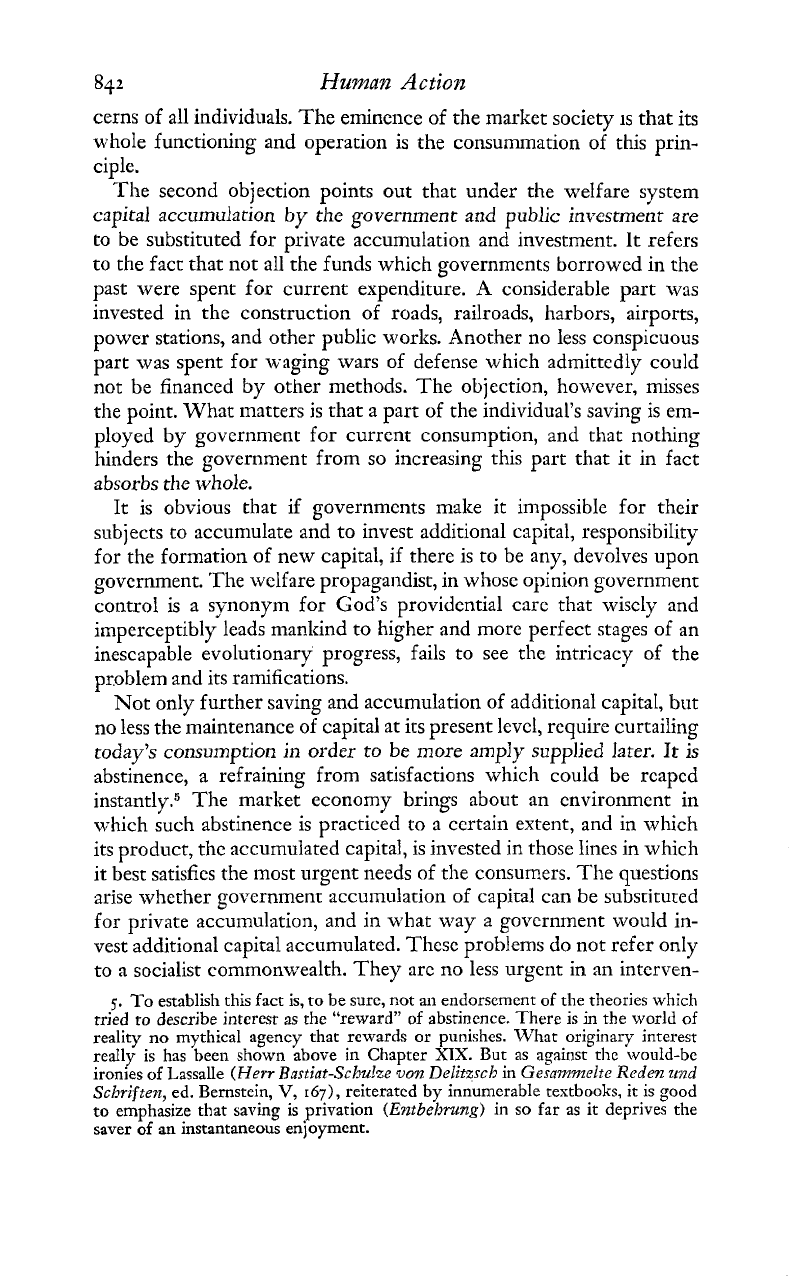
842
Human
Action
cerns of all individuals. The eminence of the market society 1s that its
whole functioning and operation
is
the consummation of this prin-
ciple.
The second objection points out that under the welfare system
capital acoumu2ation by the government and public investment
are
to be substituted for private accumulation and investment. It refers
to the fact that not all the funds which governmcnts borrowed in the
past were spent for current expenditure.
A
considerable part was
invested in the construction of roads, railroads, harbors, airports,
power stations, and other public works. Another no less conspicuous
part was spent for waging wars of defense which admittedly could
not be financed by other methods. The objection, however, misses
the point. What matters is that a part of the individual's saving is em-
ployed by government for current consumption, and that nothing
hinders the government from so increasing this part that it in fact
absorbs the whole.
It is obvious that if governmcnts make it in~possible for their
subjects to accumulate and to invest additional capital, responsibiIity
for the formation of new capital, if there is to be any, devolves upon
govcrnment. The welfare propagandist, in whose opinion government
control is a synonym for Cod's providential care that wisely and
imperceptibly leads mankind to higher and more perfect stages of an
inescapable evolutionary progress, fails to see the intricacy of the
problem and its ramifications.
Not only further saving and accumulation of additional capitaI, but
no less the maintenance of capital at its present level, require curtailing
today's consumption
in
order to be more
amply
supplied later.
It
is
abstinence,
a
refraining from satisfactions which could be reaped
in~tantly.~ The market economy brings about an environment in
which such abstinence is practiced to a certain extent, and in which
its product, the accumulated capital, is invested in those Iines in which
it best satisfies the most urgent needs of the consumers. The questions
arise whether government acculnulation of capital can be substituted
for private accumulation, and in what way a govcrnment would in-
vest additional capital accumulated. These problems do not refer only
to a socialist commonwealth. They arc no less urgcnt in an interven-
5.
To establish this fact is, to he sure, not an endorsement of the theories which
tried to describe interest as the "reward" of abstinence. There is in the world
of
reality no mythical agency that rewards
or
punishes. What originary interest
redly is has been shown above in Chapter
XIX.
But as against the would-be
ironies of Lassalle (Herr Rastiat-Schulze von Delitzsch in Gesan?melte Rcden
and
Schriften, ed. Bernstein,
V,
167)~
reiterated by innumerable textbooks, it is good
to emphasize that saving is privation (Entbehmng) in so far as it deprives the
saver
of
an instantaneous enjoyment.
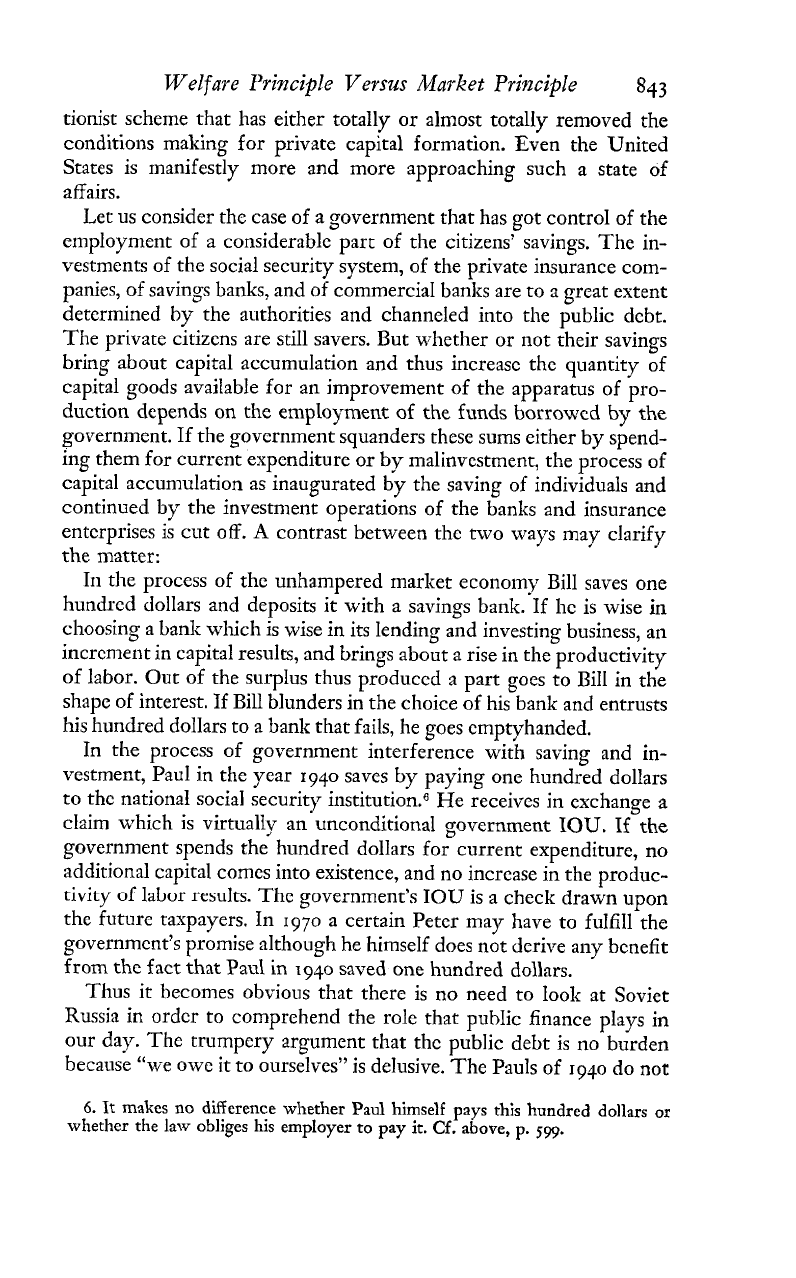
Welfwe P'rinciple Versus Marhet Principle
843
tionist scheme that has either totally or almost totally removed the
conditions making for private capital formation. Even the United
States is manifestly more and more approaching such a state of
affairs.
Let us consider the case of a government that has got control of the
employment of a considerable part of the citizens' savings. The in-
vestments
of the social security system, of the private insurance com-
panies, of savings banks, and of commercial banlrs are to a great extent
determined by the authorities and channeled into the public dcbt.
The private citizens are still savers. But whether or not their savings
bring about capital accumulation and thus increasc thc quantity of
capital goods available for an improvement of the apparatus of pro-
duction depends on the employment of the funds borrowed
by
the
government. If the government squanders thcse sums either by spend-
ing them for current expcnditure or by malinvcstment, the process of
capital accun~ulation as inaugurated by the saving of individuals and
continued by the investment operations of the banks and insurance
enterprises
is cut off.
A
contrast between thc two ways may clarify
the matter:
In the process of the unhampered ~narket economy Bill saves onc
hundred dollars and deposits it with a savings bank.-1f he is wise
in
choosing a bank which is wise in its lending and investing business, an
increment
in capital results, and brings about a rise in the productivity
of labor.
Out
of the surplus thus produccd
a
part goes to Bill in the
shape of interest. If Bill blunders in the choice of his bank and entrusts
his hundred dollars to a bank that fails, he goes emptyhanded.
In the proccss of government interference with saving and in-
vestment, Paul in the year 1940 saves by paying one hundred dollars
to thc national social security instit~tion.~ He receives in exchange
a
claim which is virtually an unconditional government
IOU.
If the
government spends the hundred dollars for current expenditure, no
additional capital comcs into existence, and no incrcase in the produc-
tivity of labor results. The government's
IOU
is a check drawn upon
the future taxpayers. In
1970
a certain Peter may have to fulfill the
government's promise although he himself does not dcrive any benefit
from thc fact that Pad
in
1940 saved one hundred dollars.
Thus it becomes obvious that therc is no need to look at Soviet
Russia in ordcr to comprehend the rolc that public finance plays in
our day. The trumpery argument that thc public debt is no burden
because "we owe it to ourselves'' is delusive. The Pads of 1940 do not
6.
It
makes
no
difference whether Paul himself
pays
this hundred dollars or
whether the
law
obliges his employer
to
pay
it.
Cf.
above,
p.
599.
